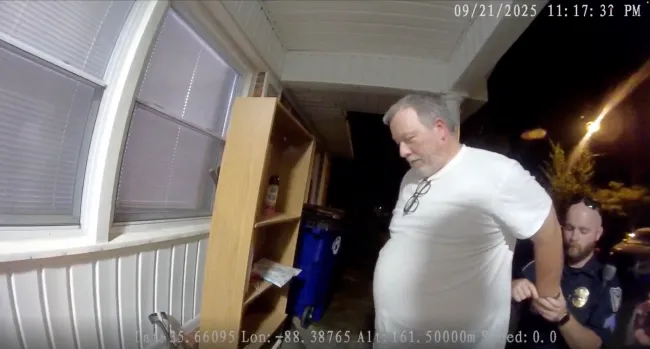The Case of Larry Bushart Jr.: When a Meme Led to Jail and a First Amendment Showdown
The arrest of Larry Bushart Jr., a retired law enforcement officer, for a Facebook meme has ignited a fierce national debate about the limits of free speech in the digital age. What began as a social media post spiraled into a month-long incarceration, a $2 million bail, and a constitutional controversy that gripped Tennessee and beyond.
⚖️ The Arrest That Sparked Outrage
On the night of September 21, 2025, 61-year-old Larry Bushart Jr. was arrested at his home in Lexington, Tennessee, under charges of “Threatening Mass Violence at a School.” The warrant was issued by Perry County Sheriff Nick Weems, following a Facebook post that authorities claimed incited panic.
The post appeared in a local Facebook group, “What’s Happening in Perry County, TN,” where members were organizing a vigil for slain conservative activist Charlie Kirk. Bushart shared a meme featuring Donald Trump alongside the quote, “We have to get over it,” referencing Trump’s 2024 comments after a school shooting in Perry, Iowa. Bushart captioned the meme, “This seems relevant today.”
Sheriff Weems argued that the mention of “Perry” in the meme led some residents to believe there was a threat against Perry County High School, sparking what he called “mass hysteria.” Bushart, he claimed, had intentionally provoked fear.
💰 The Legal Fallout: A $2 Million Bail and a Month in Jail
What followed stunned civil liberties advocates. Bushart was slapped with an extraordinary $2 million bail, a figure typically reserved for violent offenders. Unable to pay the required $210,000 to secure release, he spent over a month in jail, losing his job as a medical transport driver in the process.
However, investigative reporting soon began to unravel the official narrative. The Intercept and other outlets found no evidence that the sheriff’s department had contacted the school district about a potential threat. In fact, comments in the Facebook group showed almost no reaction to Bushart’s meme—let alone hysteria.
Bodycam footage from the arrest added another layer of absurdity. One officer told Bushart, “I ain’t got a clue,” when asked why he was being detained. Another officer candidly remarked, “Being an asshole isn’t illegal.”
🗽 Public Pressure, Legal Dismissal, and a First Amendment Win
As outrage spread, so did support. A Facebook group called “Free Larry Bushart”, launched by Chris Eargle, quickly gained traction, mobilizing thousands in defense of Bushart’s right to free expression. The Foundation for Individual Rights and Expression (FIRE) also stepped in, filing public records requests that exposed the lack of evidence supporting the sheriff’s claims.
Finally, on October 29, 2025, District Attorney Hans Schwendimann dropped all charges, citing insufficient grounds to pursue prosecution.
The case highlighted the dangers of Tennessee’s 2023 “threat of mass violence” law, enacted after the Covenant School shooting. Civil rights advocates, including the ACLU, had warned that the law’s vague language could criminalize protected speech—a prediction seemingly fulfilled in Bushart’s ordeal.
🧩 Sheriff’s Defense and the Larger Debate
Even after the case collapsed, Sheriff Weems defended his decision on Facebook, writing:
“I was elected to serve and protect Perry County. Freedom of speech does not allow anyone to put someone else in fear of their well-being.”
Critics countered that no credible evidence of fear or threat ever existed, framing Bushart’s arrest as a chilling example of government overreach and suppression of dissenting speech.
Upon his release, Bushart marked his freedom in a fitting way—by posting on Facebook again. His first message celebrated the birth of a new grandchild and linked to Elton John’s “I’m Still Standing.”
💭 Final Thoughts: The Digital Frontier of Free Speech
The Larry Bushart Jr. case exposes a deep fault line in America’s approach to online expression: the tension between public safety and the First Amendment. In an era where memes can be misconstrued as threats, the question remains—
Where do we draw the line between speech and criminal intent?
Bushart’s story is more than a cautionary tale—it’s a constitutional wake-up call for the digital age.
